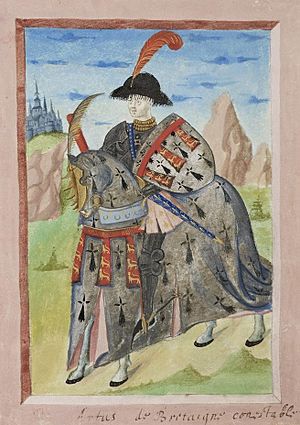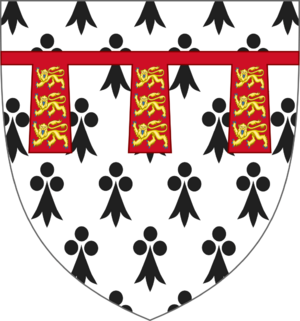Arthur III, Duke of Brittany facts for kids
Quick facts for kids Arthur III |
|
|---|---|
 |
|
| Duke of Brittany | |
| Reign | 22 September 1457 – 26 December 1458 |
| Predecessor | Peter II |
| Successor | Francis II |
| Born | 24 August 1393 Château de Sucinio, Brittany |
| Died | 26 December 1458 (aged 65) Nantes, Brittany |
| Burial | Nantes Cathedral |
| Spouse |
Margaret of Burgundy
(m. 1423; died 1442)Joan of Albret
(m. 1442; died 1444)Catherine of Luxembourg
(m. 1445) |
| Issue | Jacquetta (illegitimate) |
| Dynasty | Montfort |
| Father | John IV, Duke of Brittany |
| Mother | Joan of Navarre |
Arthur III (Breton: Arzhur), also known as Arthur de Richemont, was an important military leader during the Hundred Years' War. He was born on August 24, 1393, and died on December 26, 1458. For a short time, from 1457 until his death, he was the Duke of Brittany.
Arthur de Richemont is famous for his role as a top commander. He mostly supported the French royal family, the House of Valois. He even fought alongside the famous Joan of Arc. He was given the important job of Constable of France, which meant he was the head of the French army. His changes to the army and government helped France finally win the Hundred Years' War against England.
The name Richemont comes from an English title, Earl of Richmond. This title was often given to the Dukes of Brittany. However, the English never officially recognized Arthur as the Earl. At the very end of his life, he became Duke of Brittany. He inherited this title after his nephew, Peter II, passed away. Arthur de Richemont did not have any official children. So, his other nephew, Francis II, became the next Duke.
Contents
Arthur's Early Life and Family
Arthur was born at the Château de Suscinio in Brittany. He was a younger son of Duke John IV. His mother was Joanna of Navarre. She later married Henry IV of England and became the Queen of England.
Arthur became Duke of Brittany only a year before he died. He took over from his nephew, Peter II. Arthur also had the title of "Earl of Richmond." This earldom was often given to the Dukes of Brittany. But after Arthur's father died, the English stopped recognizing his family as earls. Even so, they still called themselves "Count of Richmond." The English title was given to John Plantagenet in 1414.
Arthur's Role in the Hundred Years' War
Arthur was a very important person at the French court. This was true even before he became the Duke of Brittany. He played a big part in the Hundred Years' War.
Fighting for France
Arthur first joined the Armagnac group in France. They were fighting against the Burgundian group. This was a civil war that lasted from 1410 to 1414. After this, he worked for the French prince, called the Dauphin. They became close friends.
Arthur gained important positions because of his friendship with the Dauphin. He became the leader of the Bastille fortress. He also became the governor of the duchy of Nemours.
Captured at Agincourt
Arthur fought in the famous Battle of Agincourt on October 25, 1415. He was wounded and captured by the English. His mother, Queen Dowager Joan, tried to get him released. But this only made her relationship with her stepson, Henry V of England, worse.
Arthur was finally released by the English in 1420. He then helped convince his brother, Duke John, to sign the Treaty of Troyes. In 1422, the English made him the Duke of Touraine. However, the English did not give him a high military command. So, in 1424, he returned to support the French Dauphin. In 1425, he was made Constable of France. This was with the help of Yolande of Aragon.
Working with Joan of Arc
As Constable of France, Arthur fought alongside Joan of Arc. They won a great victory at the Battle of Patay on June 18, 1429. He also joined his brother John in the siege of Pouancé in 1432. During this siege, he fought with English captains, even though he didn't want to. This was because the Duke of Brittany was allied with the English at that time.
Arthur regained his influence at the French court by 1435. He helped arrange the Treaty of Arras. This treaty brought peace between France and Burgundy. This peace was a big step towards defeating the English. He led the French army at the Battle of Formigny on April 15, 1450. This battle was one of the last in the Hundred Years' War. It helped France take back Normandy. After the battle, he successfully captured Caen.
Army Reforms and Final Years
In May 1444, the Treaty of Tours gave Arthur time to improve the French army. He created new military units called compagnies d'ordonnance. He also tried to organize a militia of archers called francs archers. These changes helped France win later battles.
Working with his nephew, the Duke of Brittany, he took back almost all of Cotentin in 1449. After the Battle of Formigny, he recovered all of Normandy for France. For the next six or seven years, he defended Normandy from English attacks.
When his nephew Peter II died on September 22, 1457, Arthur became Duke of Brittany. He kept his job as Constable of France. But like earlier dukes, he refused to show loyalty to the French king for his duchy. He ruled for just over a year. He passed away on December 26, 1458.
Arthur's Marriages
Arthur was married three times during his life.
- His first wife was Margaret of Burgundy. They married in Dijon on October 10, 1423. She passed away in 1441.
- His second wife was Jeanne II d'Albret. They married around August 29, 1442, in Nérac. She passed away in 1444. They did not have any children.
- His third wife was Catherine of Luxembourg-Saint-Pol. They married on July 2, 1445. She passed away in 1492.
Arthur also had a daughter named Jacqueline. She was born outside of marriage but was officially recognized in 1443.
Who Came Next?
Arthur died without any official children. His nephew, Francis II, became the next Duke of Brittany.
See also
- Dukes of Brittany family tree
 | Anna J. Cooper |
 | Mary McLeod Bethune |
 | Lillie Mae Bradford |


